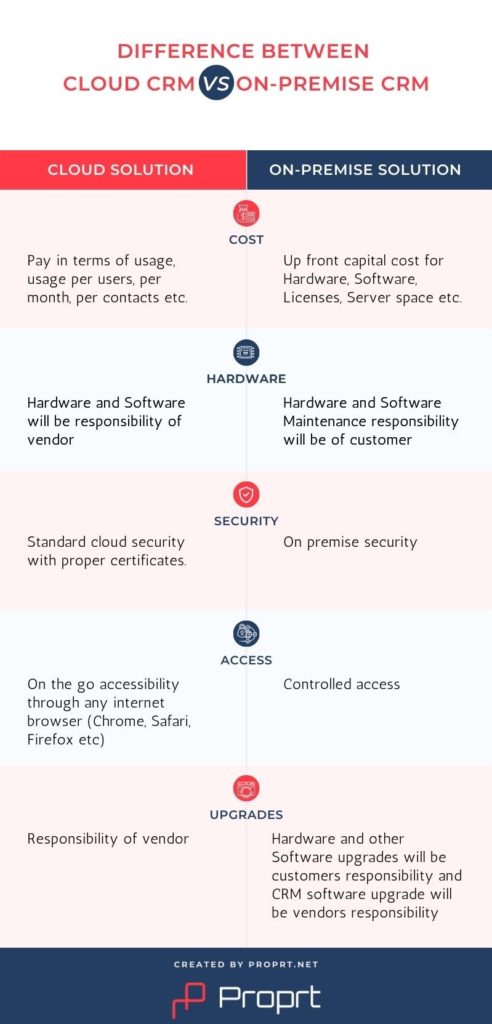The development of the CRM program, its hosting network, layout, usability, and functionality, etc., has slowly seen improvement. Previously there was just CRM on-site, so now you have an option of CRM on-site and cloud. So, which one is best suited to the organization? Until we make the right decision, let’s think about CRM on-premise and Cloud CRM in more depth.
What is On-Premise CRM and Cloud CRM?
On-Premise CRM
The ‘on-premise CRM’ applies to run CRM applications on a client computer. There, the CRM product licenses are entered according to the number of people who utilize it. The CRM program software is built on the company’s website and is operated by an independent IT department on-site.
Advantages:
- The full control of your company data is within your fingertips.
- The On-Premise CRM may be personalized and upgraded as needed.
- The On-Premise CRM eliminates data theft as all business data is available on the server of your organization.
Disadvantages:
- Upgrading the On-Premise CRM platform will be costly for the business and may also require time to implement.
- Users can view and manage data based on an IP address.
- Creating an on-premise desktop CRM device may be a headache.
- Small or medium-sized enterprises may find it difficult to afford an On-Premise CRM because the maintenance costs are high.
Cloud-based CRM
Cloud-based CRM software refers to the CRM system being hosted in the cloud. Cloud CRM is a subscription-based model that stores a database in the cloud and hosts a database on third-party servers. You can access details from everywhere at any time and carry out your market operations conveniently from any corner of the globe.
Advantages:
- All of your business data is secure and secure in the cloud. If unfortunately, you tend to lose your data, you will be allowed to back up your data. Data services conduct routine compliance checks to render all the confidential data airtight.
- You can access data from every part of the world if you have decent internet connectivity.
- Cloud computing integrates the latest technologies which make it an even better platform for data storage, data centralization, and data communication.
- The cloud infrastructure helps you to manage all your company data on a centralized network that does not limit bandwidth.
Disadvantages:
- There is no complete control of the business data as the data is managed by the third-party vendor.
- You have little power about device updates because they are completely handled by the cloud CRM vendor.
- Downtimes can occur while the servers are being repaired.

On-Premise VS. Cloud CRM Which is better?
The On-Premise CRM and the Cloud CRM provide the enterprise with other principles. The solution that fits your business is entirely based on the priorities and requirements of your organization.
Today, the organizations are preferring a cloud-based CRM program, because Cloud CRM has enabled enterprises to remain ahead of the market.
Why switch to Cloud-based CRM?
Switching to a cloud CRM will prove a valuable advantage, provided that cloud-based CRM is packed with technologies including cloud storage, cloud backup, and cloud hosting.
Whether a small corporation or a start-up, but it’s an endeavor that’s worthwhile because you’re structured and striving to maintain the business stable when rising. Any business needs to store several data based on the scale of the organization. The Excel sheets can not be used automatically because you waste hours manually. By comparison, due to the benefits of the cloud infrastructure framework with the correct enterprise management, you can maintain the job organized.
Software from Proprt offers CRM in the cloud. We are reliable Cloud CRM providers of cloud-based data management solutions for Proprt Solutions. You can contact us to know more details about the solution.